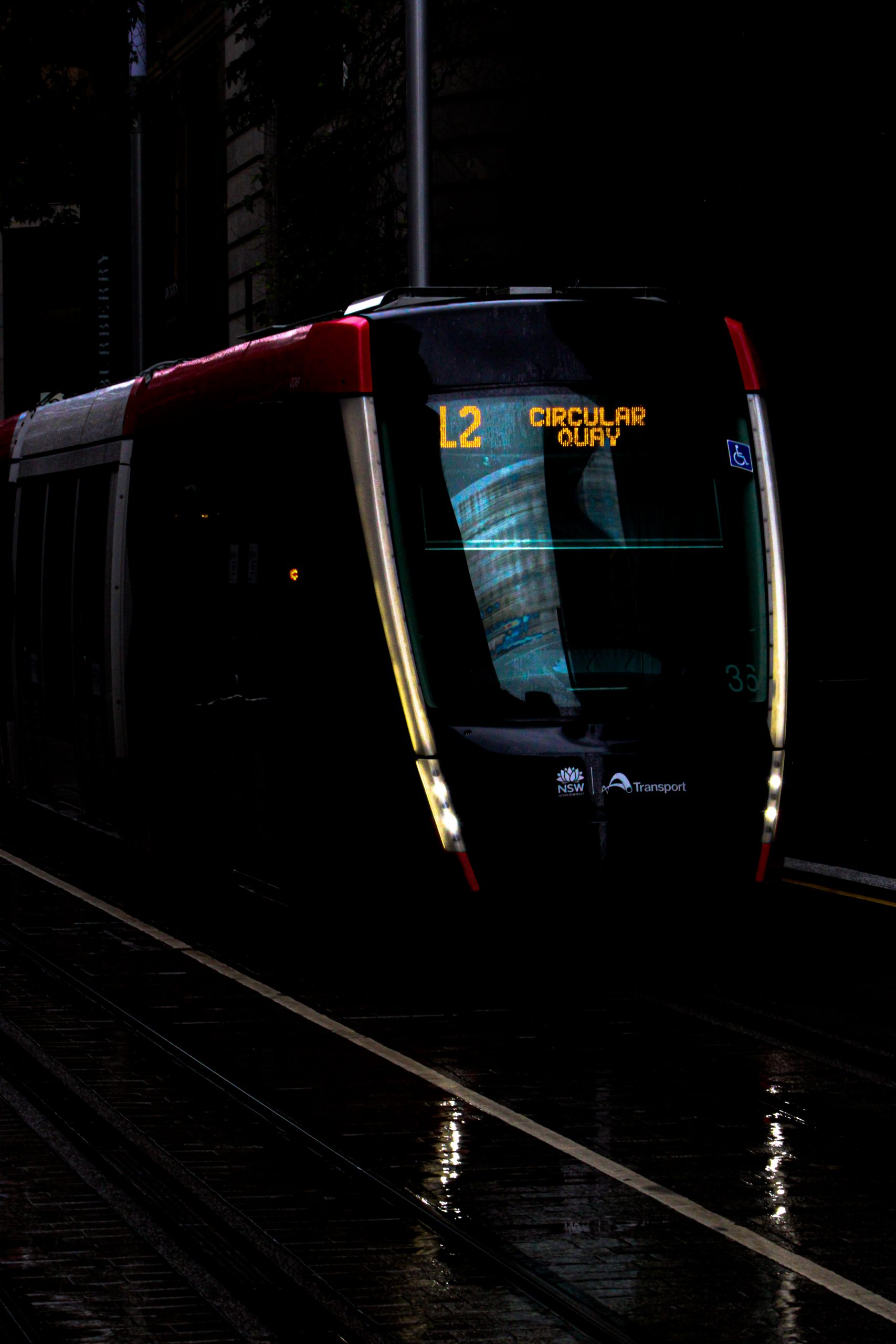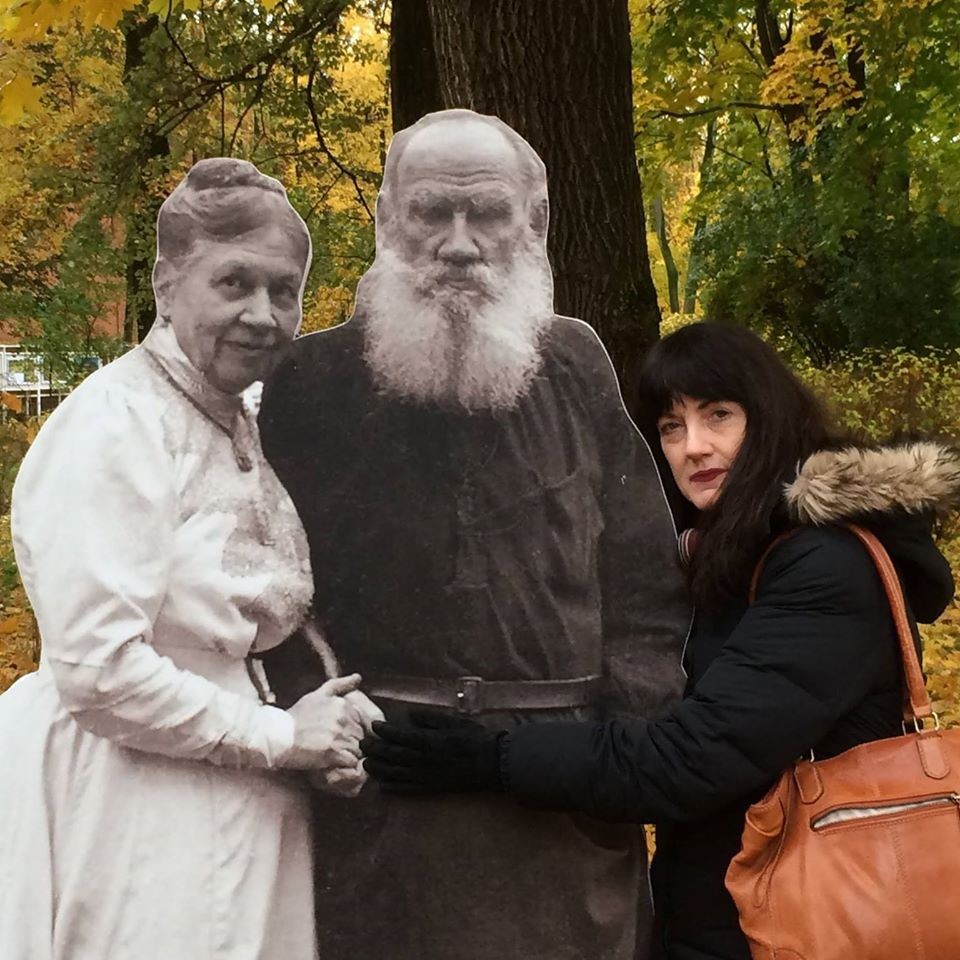Ava has been on the light rail for about two hours, possibly more; she’s not sure. A guard waved at her urgently when it terminated at Sydney Central, made her leave the carriage, so she simply stepped across the platform to another one, and has done the same again, and again. Each time the train crawls slowly, so slowly, from the city to Randwick or Kingsford and back again like a spindly dame with her walking stick. It maintains a certain grace, despite its tired gait, its rhythmic rippling. The light rail service is relatively new, yet it feels aged already. A few people, some in masks, strolled past as it inched along George Street; buses overtook it on Anzac Parade without pressing their accelerators. Or so it seemed. She watches the taciturn universe through her window; the streets are desolate, but she avoids the eyes of the few brave ones scouring the inner city.
Pulling her water bottle from her handbag she gulps a mouthful; about half of her wine is left, enough for another hour. Perhaps. She could always purchase another bottle at a grog shop at Central, hopefully. Tugging her mask down she quickly wipes her mouth with her sleeve (thank god she’s wearing her maroon hoodie) and peers surreptitiously around the wagon; luckily it’s still empty. No one has boarded for the last hour. Her belly rumbles – she’s eaten all the chips she shoved in her bag as she snuck from the house – but she’ll ignore it, for now. Ordering food at one of the few open takeaway joints is torture, especially when staff look quickly away from her puffy purple eye; it’s humiliating enough buying wine. Her sunglasses only hide so much in keen fluorescent light. And she wants to avoid police; she’s already seen two cops questioning a man leaning on a telegraph pole, no doubt asking why he was roaming the streets rather than observing the lockdown laws. If they were to question her she has no idea what excuse she’d use.
She takes a deep breath; it’s been difficult respiring through the mask’s harsh fabric. The air is stale but tinged with the vinyl tang of the newish carriage and chairs. At least it’s cool in here: the door opens again to no passengers, only humidity. She sighs, thankful for the continued isolation. But no, this isn’t isolation: it’s solitude. Isolation is the flawed term being used during lockdown against the pestilence. Isolation is a bon mot, a wisecrack – being detached from the world, from her friends and work, being stuck in the house with Sonny is confinement and seclusion. Loneliness. True isolation – solitude – has eluded her.
Her phone dings: a text from Millie. Where R U Mum??? She should reply – guilt digs its claws deep into her shoulders – she should check on her two children. But she can’t bring herself to type an answer. Millie would then tell Sonny where she is.
With some luck he’s still in bed, asleep. He’ll be suffering a hell of a hangover after guzzling a bottle of whisky last night. After sneering and roaring at her till the early hours he collapsed on the lounge; she escaped the tv room, tiptoed to the kids’ bedroom to check they were asleep, then locked herself in the laundry closet. Her folded knees ached in the cramped space. She stretches them now, rests her heels on the chair before her, then faintly touches her swollen eye; it smarts. He hadn’t hit her hard, just a light slap, but her skin has always been sensitive. And it was the first time in a long time (usually he just threatens), but still. The (bitter) icing on the (very sour) cake is the fact that she can’t kick him out, that she’s unable to move anywhere else with the kids.
This morning when she snuck from the house she left a scribbled note for Millie and Nell on Millie’s dresser, said she was going to a chemist, then messaged her sister, desperate for somewhere to stay, just for the day. Surely that wasn’t too much to ask? she thinks. Just one day without him. (And, she admits to herself, one day without the kids, as well.) But Judith had been her usual sanctimonious self, staunch in her reply. You can’t stay here with us, you could be infected. God knows where he’s been. You should never have let him back!!
No, she should never have let Sonny return to the house.
They’ve been married twelve distressingly unhappy years; not a day has passed without regret. Such a cliché – the kind, loving boyfriend who morphed into a selfish, bad-tempered husband. Drunkenness and threats, then apologies when he was sober, promises to never behave that way again. One particularly bleak week she sobbed to her sister, then finally, finally, took her advice. Gathering her few fibres of courage she locked Sonny out. It was a breezy late summer day, egg-blue, the sunlight as sharp as knives. Despite the children’s panic, her sensation of liberation had been overwhelming, terrifying, thrilling. The future looked slightly luminous for a change.
That was a few months ago; around the ides of March, she remembers grimly. All that week he’d yelled at the front door, begging her to open it. No one would have him, apparently; lockdown was in effect. Sleep in your car! she cried through the door, shamefully waving the girls away as Nell shrieked and threw toys at her. Sonny promised not to drink, to behave; the lockdown would be like a holiday. From the rickety bench in their small front yard he sent her a text: working from home would mean he’d be less stressed, they could focus on their relationship, sort their differences without anyone interfering or telling her lies; with winter coming they could watch movies in the warmth of the heater, sipping hot chocolate and playing rummy or monopoly. A real vacation! He’d left voice messages on her phone, apologising as he wept, begging her to forgive him. He would turn a new leaf, be an ideal husband.
Well.
That had lasted less than a week. She winces as she recalls one particular morning, her voice hoarse from the night before when he’d clamped his hand on her throat and punched a hole in the fibro wall near her head. She perched on Millie’s bed, holding the two girls tightly in her arms, hiding her blotched wet face, her seared neck. A butcher bird singing to itself in the soft citrine dawn had broken her heart: why did it get such freedom? Such solitude? Why could it do whatever the hell it desired?
She stands, her buttocks cramped from sitting so long. Outside boys on bikes zigzag past the train, riding shockingly down the middle of the wide road; a masked woman jogs across pulling her dog. No planes zoom above, few cars rumble past, the cafes and restaurants are shuttered; superficially the planet is quiet and calm. She could linger here, in this carriage, all night. All year. But she should, she knows, she must call her children. Sonny isn’t a bad father – whatever his mood he’ll feed them when he wakes, check they’re doing their home schooling – but in delaying her return she’s being a very bad mummy, and that’s unforgiveable.
Just half an hour more, she begs herself, half an hour of aloneness. But settling into the seat, tousling with the guilt, she glances at the luminated screen. The train is approaching her street; if she remains on board she’ll be unable to return home for hours. She grits her teeth, tosses her handbag over her shoulder and, supporting herself at the door, grips the pole, crushing her fingers into its steel. Perhaps they’ll melt through and weld her to the rail.
As the train slows a woman on the footpath pleads with a toddler. Her t-shirt is smeared and her tracksuit pants stained, her blonde hair knotted in an untidy bun. The child punches at its mother, throws itself on the ground and kicks at her. Beside her a puce-faced baby screams in a pram. The blonde waves frantically at a heavy man on the corner, but he fiercely shakes his head. ‘I’ll see you at home,’ he yells, then trudges away. ‘Daddy!’ the toddler howls, continuing to kick at the woman.
The train’s maw opens wide; again Ava is hit with the jaundiced late-season humidity. She doesn’t move, watches the blonde; then suddenly catches her eye. The woman blushes, shrugs her shoulders as if saying, ‘Kids!’, then almost squatting drags the warring toddler into her arms and clumsily propels the pram forwards with her elbow, her shoulders hunched.
Ava’s feet remain glued to the rubbery deck. The door seals. She returns to her seat, adjusts her mask, and gazes through the opposite window. Just one more day, she decides. The sunset, tangerine and hungry, glares at her.
Photo by Luke White on Unsplash

